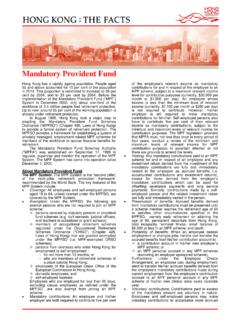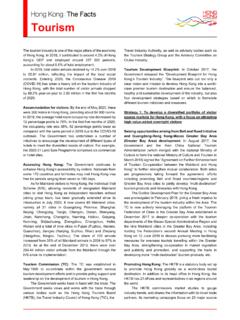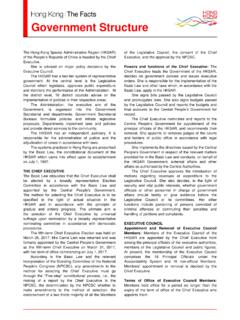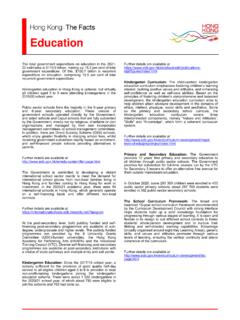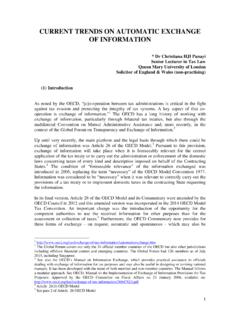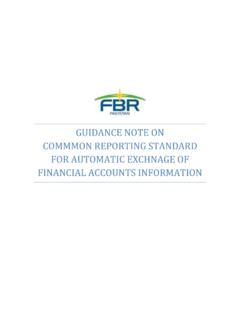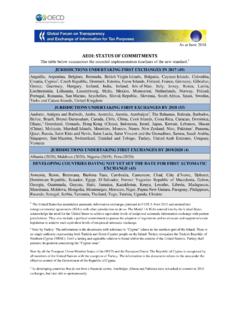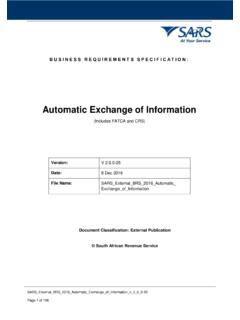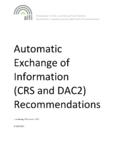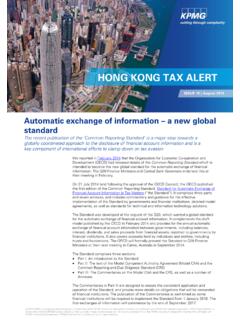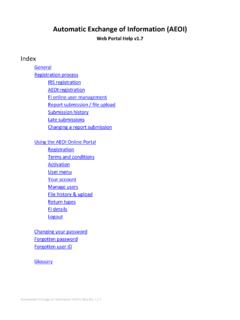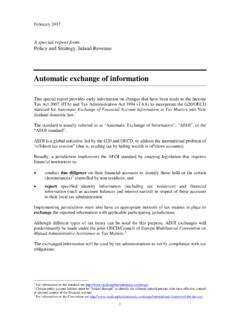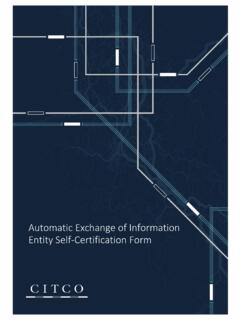Transcription of Consultation on Automatic Exchange of Financial Account ...
1 - 1 - Consultation Paper on Automatic Exchange of Financial Account information in Tax Matters in Hong Kong - 2 - EXECUTIVE SUMMARY Exchange of information ( EOI ) for tax purposes is an important avenue to enhance tax transparency and combat cross-border tax evasion. As an international Financial centre and a responsible member of the international community, Hong Kong has committed to enhancing the tax regime to facilitate Exchange of tax information with other jurisdictions in accordance with the international standard promulgated by the Organisation for Economic Cooperation and Development ( OECD ). 2. It has been the Government s priority to conclude comprehensive avoidance of double taxation agreements ( CDTAs ) with Hong Kong s trading and investment partners to facilitate business and minimize the incidence of double taxation.
2 All CDTAs signed embody a mechanism for EOI with our treaty partners. In addition, we have signed tax information Exchange agreements ( TIEAs ) purely as instruments for EOI; TIEAs do not offer taxation relief. 3. The OECD standard for EOI permits Exchange of information upon request or on Automatic or spontaneous basis. So far, Hong Kong has only opted for EOI upon request. However, the international landscape on tax cooperation has been evolving rapidly. OECD released in July 2014 the Standard for Automatic Exchange of Financial Account information in Tax Matters ( AEOI ), calling on governments to collect from their Financial institutions Financial Account information of overseas tax residents and Exchange the information with jurisdictions of residence of the relevant Account holders on an annual basis.
3 4. The Global Forum on Transparency and Exchange of information for Tax Purposes ( Global Forum ), a 120-strong international organisation pursuing tax transparency, has invited all its members, including Hong Kong, to commit to implementing the new global standard. It has also established a mechanism to monitor and review the progress of implementation amongst members from 2017 onwards. By the end of October 2014, over 90 jurisdictions have expressed commitment to the new standard. As a responsible member of the international community and to avoid being labelled as an uncooperative jurisdiction which will affect our position as an international Financial centre, we indicated to the Global Forum in September 2014 our - 3 - support for implementing the new standard on AEOI on a reciprocal basis with appropriate partners which can meet relevant requirements on protection of privacy and confidentiality of information exchanged and ensuring proper use of the data, with a view to commencing the first information exchanges by the end of 2018.
4 We have stated clearly that our commitment was premised on the condition that Hong Kong could put in place necessary domestic legislation by 2017. 5. Hong Kong has been practising a simple, territorial-based tax regime. Moving towards AEOI requires fundamental changes to our policy and legal framework and to our established position of implementing EOI only on request. In developing the model for AEOI in Hong Kong, we need to ensure that our model meets the international standard without creating undue burden of compliance on the Financial institutions and their non-Hong Kong tax resident Account holders. We will adopt a pragmatic approach to include all essential requirements of the AEOI standard in our domestic law and will ensure effective implementation of the international standard.
5 6. The key components and requirements of the AEOI standard are summarised in Chapter 1 of this paper. We have conducted informal exchanges with various Financial institutions, professional bodies and chambers of commerce. Based on their preliminary feedback and our research into the legislative proposals being considered by other jurisdictions, we have set out our latest thinking on how a Hong Kong model for AEOI may look like, in terms of the legislative regime (Chapter 2) and the operational framework (Chapter 3). We plan to consult stakeholders from April to June 2015 and have flagged up a few key areas for gauging views (Chapter 4). We aim to introduce an amendment bill into the Legislative Council ( LegCo ) in early 2016, put the legislation in place by 2017 and commence the first Automatic information Exchange by end of 2018.
6 - 4 - CHAPTER 1 KEY COMPONENTS OF AEOI STANDARD What is AEOI? According to the standard promulgated by OECD, AEOI involves systematic and periodic transmission of Financial Account information by the source jurisdiction to the jurisdiction of residence of the Account holders ( non-Hong Kong tax residents) concerning all types of investment income, Account balances or values, and sales proceeds from Financial assets on an annual basis. The scope of Financial Account information to be exchanged is prescribed and unified under the OECD standard. The information which is exchanged is collected in the source jurisdiction on a routine basis, through reporting by the Financial institutions ( FIs )1 to the competent authorities.
7 Hence, Automatic Exchange does not mean a free flow of information amongst jurisdictions. AEOI has to be underpinned by tax treaty agreements. First, there has to be a bilateral agreement ( CDTA or TIEA) or a multilateral agreement ( the Multilateral Convention on Mutual Administrative Assistance in Ta x M a t t e r s ) between / among the jurisdictions concerned to serve as the legal basis for tax information Exchange . Second, the competent authorities have to enter into a Competent Authority Agreement ( CAA ), which provides for the modalities of Exchange to ensure the appropriate flow of information in accordance with the standard. Components of the AEOI Standard Specifically, the AEOI standard comprises - (a) Model Competent Authority Agreement ( Model CAA ).
8 This is a template for the agreements on AEOI between competent authorities, typically the tax authorities. (b) Common Reporting Standard ( CRS ). This specifies the standards and requirements for the following - 1 According to the Common Reporting Standard, there are Reporting FIs and Non-reporting FIs. For the sake of simplicity, FIs in this Consultation paper refers to all Reporting FIs unless otherwise specified. - 5 - (i) FIs this includes banks, custodians, insurance companies, brokers and investment entities (such as certain collective investment vehicles), unless they present a low risk of being used for evading tax and are excluded from reporting (such as prescribed retirement schemes).
9 (ii) Reportable Account information the information which FIs have to report on each Financial Account holder comprises n personal data ( name, address, date and place of birth, jurisdiction of residence and taxpayer identification number ( TIN )2 of the Account holder); and n Financial data ( interest, dividends, Account balance or value, income from certain insurance products, sales proceeds from Financial assets and other income generated with respect to assets held in the Account or payment made to the Account ). (iii) Reportable accounts this covers accounts held by individuals and entities (which include foundations and trusts). FIs are required to look through passive entities and to report on the relevant controlling persons ( the beneficial owners).
10 (iv) Due diligence procedures this covers the process and procedures for FIs to identify reportable accounts from pre-existing and new individual accounts, and pre-existing and new entity accounts; to ascertain the tax residence and other reportable Account information of the Account holders; and to report such information to the competent authority as of the end of the reporting period in line with the scope prescribed. (c) Commentaries on the Model CAA and CRS. This elaborates on the requirements in the Model CAA and CRS. While seeking to ensure consistent application and operation of the AEOI standard, it also provides for exceptions, amongst others, in the following aspects (i) Account balance or value FIs must report the balance or value of the Account as of the end of the calendar year or other appropriate reporting period or, if the Account was closed 2 The term TIN means Taxpayer Identification Number (or functional equivalent in the absence of a Taxpayer Identification Number).


